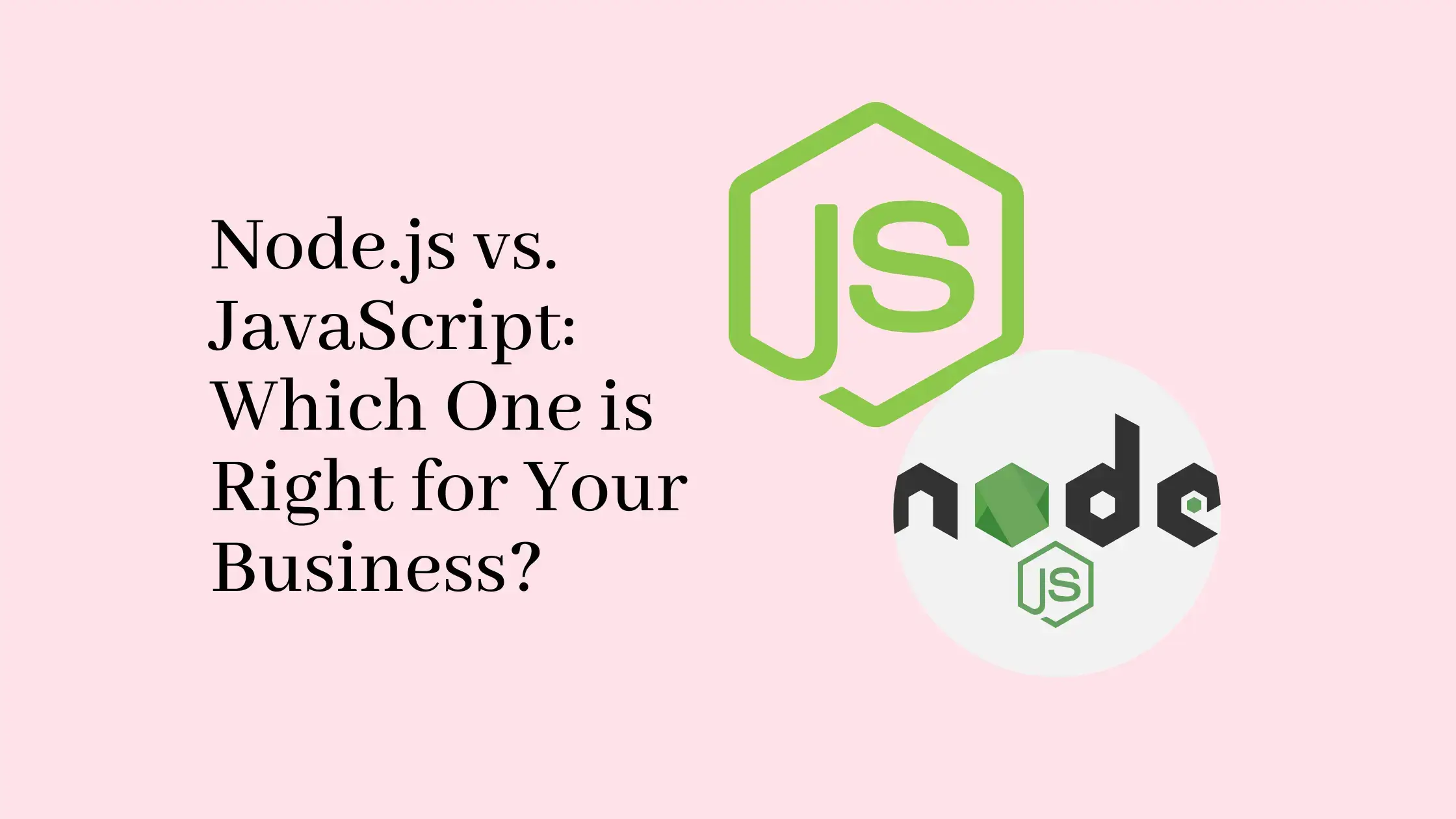Introduction:
Our web pages and online apps become dynamic and interactive thanks to JavaScript, a high-level programming language that allows them to reason and act. In contrast to Node, JavaScript is an object-oriented programming language that is lightweight (with simple syntax). A collection of objects and functions that JavaScript programs can access is commonly represented by the js runtime environment based on the Google v8 engine.
Javascript:

Brendan Eich of Netscape created the initial iteration of JavaScript, which was released in 1995. (then called LiveScript). As was already mentioned, JavaScript is a high-level programming language with all the standard programming language features. JavaScript is an object-oriented programming language we can use on both the client and server sides. In addition to being used by programmers to create web pages, JavaScript is also used to develop games and mobile applications.
Node.js:

Node.js, created by Ryan Dahl in 2009, is a JavaScript runtime environment built on Google’s v8 Engine. Its primary function is to run JavaScript on the server, enabling JavaScript to be executed outside the browser. The best feature of Node.js is that it is event-driven, never blocks I/O, and can be used to build extremely scalable programs. Node.js is a module, and developers utilize these modules to create web APIs, Rest API servers, command-line programs, and real-time chat programs.
Difference between javascript and Node.js:
A runtime environment called Node.js is based on Google’s v8 Engine, whereas JavaScript is a simple high-level programming language used to develop web scripts.
While Node.js enables us to run JavaScript outside the browser, JavaScript is often executed within the browser.
Node.js cannot add HTML, whereas JavaScript can change the DOM or add HTML.
JavaScript is mostly used to develop client-side or online front-end applications, whereas Node.js is used for server-side or backend development.
When building network programs, JavaScript adheres to the JavaScript standard. However, Node.js, written in C++ and using the v8 Engine to run JavaScript outside the browser, does not.
JavaScript needs any runtime environment because it can run on any engine, including the client-side JavaScript core in Safari and the v8 Engine of Google Chrome. In contrast, Node.js can only run on the v8 Engine of Google Chrome.
Web browsers can run the popular programming language known as JavaScript. Node.js, in contrast, is a JavaScript interpreter or running environment that contains several requisite valuable libraries. JavaScript is one simple programming language that defines standards; it can run any browser in a standard execution environment. It is an extremely powerful dynamic language typically used for web applications requiring verification or business logic. Without refreshing the page, we must append it to the screen. JavaScript also makes it possible to employ Ajax anytime, allowing us to call any remote server-side script for dynamic data as needed. Additionally, it aids in creating dynamic HTML tables according to company needs. One of the widely used libraries to easily use JavaScript without writing a lot of source code is JQuery.
Additionally, Node.js contains a large number of related popular libraries that are typically used in javascript, a general-purpose server-side scripting language. It is a type of environment or Node interpreter that can run any JavaScript program or represent JavaScript. It mostly aids in executing non-blocking database operations, such as using node js to access operating system-specific information like hardware specifications or certificate data. JavaScript standard programming is ineffective for this, though. The JavaScript engine in most browsers allows us to run JavaScript in a web browser. Some popular browsers that use the JavaScript engine include Spider Monkey (Firefox), JavaScript Core (Safari), and V8 (Google Chrome). However, node js uses the V8 Engine with a few modules to do networking or I/O activities. It makes it easier for us to utilize JavaScript outside of a browser, such as when writing, executing, or constructing a shell script, using some backend services, or using hardware. Let’s compare JavaScript with Node JS in more detail.
A key difference between node.js and javascript:
- Any browser that supports JavaScript Engine can run this straightforward popular language. Node JS, a JavaScript interpreter or runtime environment with many excesses, needs libraries we can easily access from JavaScript programming to function better.
- Any client-side functionality for a single web application often uses JavaScript. A task can be an activity dealing with business validation, a dynamic page display at a scheduled time interval, or a simple Ajax call task. Any web application can only use those for a certain amount of time, unlike Node JS, which is used mainly for non-blocking operations on any operating system. Non-blocking functions on an operating system include:
- Writing or running shell scripts.
- Obtaining specific hardware-related information in a single call.
- Accessing installed certificate information in the system.
- Doing other defined tasks.
- JavaScript runs on any engine, such as V8 (Safari), JavaScript Core (Firefox), and (Google Chrome). Programming in JavaScript is, therefore, quite simple, and a good browser can run in any environment. In contrast, Node JS only supports the V8 Engine, which is unique to Google Chrome. But written JavaScript code can function in any context, regardless of whether it supports the V8 Engine. Therefore, it is not restricted to any particular browser.
- JavaScript often adheres to the standards of the Java programming language. Although there may be differences in how code is written, it is still possible to assert that it complies with the need for the Java programming language. We can launch a created javascript program in any browser environment thanks to node JS, developed in C++ and provides a V8 engine base browser javascript running Engine.
- Any operating system access requires a specialized non-blocking job. Although JavaScript contains certain unique objects, they are entirely OS-specific. The Windows-only ActiveX Control is one illustration. However, Node JS can do various non-blocking operations specific to a given operating system from JavaScript programming. There are no operating system-specific constants in it. Node JS is adept at building a special coupling with the file system that enables the developer to read and, occasionally, write data on the disc.
The basic difference between javascript and node.js:
Javascript:
- Type:
Programming language JavaScript. Any web browser that has a proper browser engine can run it.
- Utility:
Mostly used for any client-side operation for a web application, such as potential attribute validation, periodic page refreshes, or provision of dynamic changes in web pages without refreshing the page.
- Running Engine:
JavaScript runs on any engine, such as V8, Spider Monkey (Firefox), and JavaScript Core (Google Chrome).
Node.js:
- Type:
It is a JavaScript interpreter and environment that includes certain important, specialized libraries that JavaScript programming can utilize independently.
- Utility:
It is mostly used for accessing or carrying out non-blocking operating system operations, such as writing or running a shell script, getting access to hardware-specific data, or doing any backend tasks.
- Running Engine:
Only the V8 Engine, mostly used by Google Chrome, can run Node JS. We will always run JavaScript programs created with Node JS in the V8 Engine.
Conclusion:
JavaScript is a very well-liked multi-threading programming language typically utilized by anyone creating web applications. It is simple to discover a resource on the subject. Node JS is a JavaScript library extension, but it also includes some unspecified utilities, such as non-blocking operating system activity, that are occasionally crucial for fulfilling organizational requirements. It is a common necessity for security reasons to record the original MAC IP of every network-centric application user, notify them, or keep an audit trail with accurate data on how many system users typically log in to their application developer and at what time. Additionally, it may occasionally inform the user that you are logged in from a different PC for security reasons.
FAQs:
What makes Node JS development a great option for businesses?
We considered scalability during design.
Ruby or PHP are more scalable than Node JS. But compared to other backend technologies, it is much simpler to grow. Expanding and scaling their product is a major benefit for businesses.
Do large businesses employ Node JS?
The following businesses used Node.js and saw significant improvements: Netflix, NASA, Trello, PayPal, LinkedIn, Walmart, Uber, Twitter, Yahoo, eBay, and GoDaddy. Brief Summary You may have heard about Node. Js apps’ high speed & performance power enterprises.

Priyadharshini K.R is a professional blogger with over 3 years of experience who works at Squash Apps. She is dedicated to providing high-quality content to help clients get more visibility on the search engine result pages. She works hard to boost her clients’ online presence through various content writing services. Hailing from Erode, she is passionate about helping people understand content marketing through easily digestible materials.


